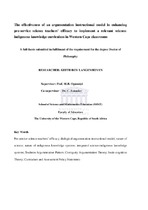| dc.contributor.advisor | Ogunniyi, Meshach B. | |
| dc.contributor.advisor | Fakudze, C. | |
| dc.contributor.author | Langenhoven, Keith Roy | |
| dc.date.accessioned | 2015-08-18T15:46:57Z | |
| dc.date.available | 2015-08-18T15:46:57Z | |
| dc.date.issued | 2014 | |
| dc.identifier.uri | http://hdl.handle.net/11394/4396 | |
| dc.description | Philosophiae Doctor - PhD | en_US |
| dc.description.abstract | The study investigated the impact of a dialogical argumentation instructional model (DAIM) as an intervention teaching strategy to assist pre-service science teachers to implement integrated science-indigenous knowledge (IK) lessons during their seven week block teaching practice at schools in the Western Cape. This imperative is found in Specific Aim 3 of the Curriculum and Assessment Policy Statement (CAPS) of the South African School Curriculum (Department of Basics Education, 2011). The study focussed on the pre-post conceptions of pre-service science teachers’ conceptions of the nature of science and the nature of indigenous knowledge. In addition the study examined pre-service teachers’ sense of self-efficacy in deploying a dialogical argumentation instructional model to implement an integrated science-IK lesson. The sample consisted of a cohort of thirty (30) Post-graduate Certificate of Education (PGCE) students training to teach at the Further Education and Training (FET) phase of school. They were a combined class enrolled for method in Natural Sciences, Life Sciences and Physical Sciences. A mixed methods approach was used to generate quantitative and qualitative data using a series of questionnaires, reflective diaries, journals and focus group interviews. Transcripts provided a rich bank of data of which only exemplars were used to highlight trends and to illustrate how theoretical constructs were used as analytical tools. The theoretical constructs used were Toulmin’s (1958/2003) Argumentation Pattern (TAP), Ogunniyi’s (1997) Contiguity Argumentation Theory (CAT) and Banduras’ Social Cognitive Theory (1986). The findings showed that the pre-service teachers appeared to overestimate their sense of self-efficacy (i.e. the ease and comfort) in using DAIM to implement a science- IK curriculum at the pre-test than at the post-test. The study also identified important implications for policy, teacher training programmes, teaching practice, pre-service science teachers, learners and further research. Furthermore, the pre-service reflective experiences indicated their increased awareness of the challenges and successes related to using dialogical argumentation to integrate a science-IK lesson. The most important contribution of this study to an argumentation paradigm was the emergence of a visual model called the Pyramid Argumentation Model that succinctly connected the apparent disparate module units in a holistic way (To be discussed in follow-up reports). The findings revealed numerous complexities as the participants navigated their own cosmologies of a scientific worldview and that of their indigenous knowledge worldview. Finally, the findings have not only corroborated the findings in earlier studies with respect to the merits and demerits of argumentation instruction but also identified various challenges that prospective and even practicing teachers might encounter in an attempt to make school science relevant to the sociocultural environment of learners especially those living in indigenous or traditional societies like the participants in this study. | en_US |
| dc.language.iso | en | en_US |
| dc.publisher | University of the Western Cape | en_US |
| dc.subject | Pre-service science teachers’ efficacy | en_US |
| dc.subject | Contiguity argumentation theory | en_US |
| dc.subject | Nature of science | en_US |
| dc.subject | Socio-cognitive theory | en_US |
| dc.title | The effectiveness of an argumentation instructional model in enhancing pre-service science teachers’ efficacy to implement a relevant science indigenous knowledge curriculum in Western Cape classrooms | en_US |
| dc.rights.holder | University of the Western Cape | en_US |

